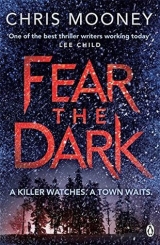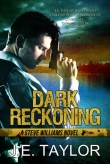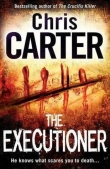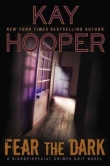
Текст книги "Fear the Dark"
Автор книги: Chris Mooney
Соавторы: Chris Mooney
сообщить о нарушении
Текущая страница: 16 (всего у книги 26 страниц)
47
Betty spoke into her headset. ‘911, what is your emergency?’
On the end of the line Darby heard rapid breathing.
Crying.
Her attention was fixed on the monitor with the ANI/ALI screen. The software had caught the incoming number but there was no address.
Land-line calls were traced in a matter of seconds. Call from cell phones took longer; the software had to triangulate the signal as it bounced between towers. Betty moved her computer mouse with one hand and punched her keyboard with the other.
Now a frightened woman’s voice: ‘He’s got us tied up in the bedroom. Me and my family.’
Darby felt cold all over. She leaned forward in her chair, elbows on her knees, and stared down at the scuffmarks on the floor. The voice had a slight echo to it. She’s on a speakerphone, Darby thought.
‘There’s a rope tied around my neck,’ the woman sputtered.
From the corner of her eye Darby could see Coop looking at her, and she recalled what he had said to her before she went into the squad room to do the interview: I saw the list of questions and answers the two of you came up with. You go on the record saying those things, you might as well be jamming a stick of dynamite up this guy’s ass. Once you light the fuse, who the hell knows how he’s going to react? Maybe he’ll decide to take his aggression out on someone else instead of you. ‘Is the intruder inside the room with you?’ Betty asked. While she had been taught to keep her emotions in check, to speak clearly and calmly, Darby caught a slight hitch in the woman’s reedy voice.
The woman on the phone didn’t answer. He’s listening in on the conversation, Darby thought. He’s telling her what to say.
‘Ma’am, are you still there?’ Betty asked.
‘Yes,’ the woman sputtered. ‘Yes, he’s here with me. With us.’
‘Where do you live, ma’am?’
Another pause. Darby pictured the killer whispering the answer into the woman’s ear. She looked again at the ANI/ALI screen. Still no address.
‘He said to put her on the line. Darby McCormick.’
‘I’m right here,’ Darby said.
Then the woman broke down, sobbing hysterically. ‘He just put a bag over my husband’s head, please, you’ve got to help us. Twenty-two –’
The woman started choking.
He’s strangling her. Darby hit the mute button on her headset and whipped round to Betty. ‘Why’s the address taking so goddamn long to trace?’
Betty’s eyes didn’t move from the screen. Police Chief Robinson answered the question. ‘We don’t have the software to trace cell signals,’ he said. ‘Only the state police can do that, system called One-Click.’
The woman’s choking filled their headsets.
Robinson continued. ‘Betty already bumped up the call to them. They can’t pinpoint a cell signal’s exact location, but they can give us co-ordinates, longitude and latitude. We’ll be able to get an address with that.’
‘How long is this gonna take?’
Robinson didn’t have an answer. Over her headphones Darby thought she heard the crinkling sound of a plastic bag and her heart leapt high in her chest. She got back on the line, reminding herself not to beg: begging was the lifeblood of a sadist, what fed their need to torture. Beg and he’d start to kill everyone.
‘You wanted to talk to me,’ she said into the microphone. ‘I’m here. Tell me what you want.’
Silence. Still no address listed on the screen.
‘Tell me what you want,’ Darby said again.
Then a gulping and gasping sound roared over their headphones, like the noise of someone breaking to the surface of the water after having been submerged.
‘Alone,’ the woman managed to say. Her wretched coughs exploded over the line for what seemed like minutes. ‘Come alone and he’ll won’t kill us.’
‘I’ll come alone; you have my word,’ Darby said. ‘Tell me where you live.’
Hysterical sobbing. ‘Please help us.’
‘I’m coming. Alone. Give me your address –’
‘Please.’
Click and the call ended.
48
Palms damp and her throat dry, Darby glanced at Coop and saw the thinly disguised blame in his eyes. She looked away from him, at Hoder, who was standing near the doorway. The colour had drained from his face. Betty hit the redial button for the phone number.
Darby felt sick and clammy, and she had trouble swallowing. A voice that wasn’t her own, cold and flat and without mercy, broke in and said: He’s using the family as bait. He’s setting a trap for you so he can kill you.
‘No matter how we cut it, someone is going to have to go into that house,’ Darby said. ‘It may as well be me.’
Coop, not surprisingly, was the first to speak. ‘The family’s dead and you know it.’
Hoder nodded in agreement. ‘Coop’s right,’ he said. ‘He wants you to come alone so he can lure you into a trap.’
‘And if I don’t do as he instructed – if you send in the first responders, then the EMTs – who the hell knows how he’s going to act?’ Darby asked. ‘If he wants me to come alone, chances are he’s somewhere close by, watching the house. Once we get the address, I say we set up a perimeter and block him in.’
Then Darby looked at Robinson and said, ‘You let the emergency people in there first, they’ll be going in blind. If our guy has set some sort of trap, they won’t know what to look for. I will. I’m the best candidate, and besides, it’s me he wants anyway.’
Coop threw up his hands. ‘This is insane.’
‘And what if the family’s still alive?’ Darby asked.
‘There’s no way you honestly believe that – I know you don’t believe that. He wants you to go there so he can kill you – that’s why he had that woman feed you that bullshit line about how he won’t kill everyone if you come. He’s playing off your sense of decency. You’re letting a psychopath manipulate you.’
‘I’ll need a car. I left mine at the bar.’
‘You can’t save that family. They’re gone. What this is about is your guilt.’
Then Coop’s expression transformed itself into an odd mix of grief and sympathy – the look of a man about to suffer an irrecoverable loss. ‘And it’s going to kill you,’ he said.
Betty spoke up. ‘Staties traced the cell signal,’ she said, and handed Darby a slip of paper. ‘22 Exeter Road, in Red Hill.’
‘How far away is it?’
‘In normal conditions, I’d say about six, ten minutes max.’
Darby got to her feet. She felt a cold and hollow spot in the pit of her stomach.
Robinson held out his car keys to her. ‘Take my truck,’ he said. ‘White Ford parked out front. It’s got four-wheel drive so you won’t get stuck out there.’
‘Your truck got GPS?’
‘No.’
‘Then I’ll need you to give me directions. You can relay them to me over the phone. Tell me what number to call.’ Darby gave the slip of paper in her hand to the police chief.
Coop looked at her longingly. Don’t do it, his eyes said. Please.
Robinson handed the paper back to her. ‘I’ll coordinate everything from here,’ he said. ‘I have everybody’s numbers.’
Darby left the room. When she reached the end of the corridor, she turned and, glancing back to the call centre, saw Coop setting down his headphones on the counter. He had the look of a man placing a rose on top of a coffin about to be lowered into the ground.
49
The snow was still coming down at a furious clip, thick and wet, but the roads Darby took had been ploughed. She parked the police chief’s truck at the top of the driveway belonging to the house at 22 Exeter Road. Coop was riding with Hoder, and their car was parked near the perimeters that had been set up in a quarter-of-a-mile radius around the house. It belonged to the French family, Robinson had told her. Luther and Carla French had a 23-year-old son named Sebastian and an older daughter, Rita, who was twenty-six.
In her headlights she caught glimpses of the pleasant brown Colonial with its attached two-car garage. There didn’t appear to be a single light turned on. She could also make out a series of depressions, holes caused by the Red Hill Ripper’s footsteps, in the driveway leading up to the front of the house.
‘I’m here,’ she said into the phone. She killed the engine and pocketed the keys. ‘Don’t have any of your people move in until I’ve cleared the house.’
‘Understood,’ Robinson replied. ‘Good luck.’
Darby opened the door to a blast of cold air. She got out and clipped the satphone to her belt near the front of her jeans, so Robinson could hear her back at the call centre. Then she removed the nine from her shoulder holster and attached a tactical light underneath the muzzle. She clicked off the safety, pulled back the receiver and eased a round into the chamber. Then she shut the truck’s door and trudged through the white, knee-high blanket covering the driveway.
Snow as sharp as needles blew against her face, and it was bitterly cold. As she got closer, she saw that the front door was wide open, like an invitation, and again she wondered what was waiting for her inside.
Was Coop right when he said she was allowing a psychopath to manipulate her? Probably. And maybe her need to go in there alone, as instructed, had something to do with her guilt about having gone ahead with the video interview. She had no way of knowing whether the Red Hill Ripper had watched it, and, if he had, if it had prompted him to vent his rage on another family. What if the Ripper had been planning this moment, this endgame, or whatever it was, from the moment she’d arrived?
During the journey, her imagination had gone into overdrive, conjuring up all sorts of grisly scenarios and possibilities. There had been a case just outside Boston where a serial killer murdered families and then planted bombs for when the police arrived. Her first major serial case had involved Traveler: he had blown up a SWAT van and later bombed a major Boston hospital. Had the Ripper taken a page from their book? What if he had come up with another way of killing her? In Boston a killer had booby-trapped a closed door with a shotgun. The first responding officer had opened the door and nearly had his head blown off.
Conjuring up different scenarios was both useless and unproductive. She wouldn’t know anything until she got into the house. Right now she needed to keep her attention sharp and focused. She clicked on the tactical light beneath the gun’s muzzle and brought up the nine as she mounted the steps to a small, enclosed front porch. The snow had stopped blowing against her face, but not the wind; it hit her like a fist and roared inside the dark house. She cleared everything in her immediate line of vision; and then she darted to the right side of the door and pressed her back against the vinyl siding, blinking the melting snow out of her eyes.
Darby took off her jacket – the thick leather would only encumber her – and dropped it on the porch floor. Her face and hair, which she had tied behind her head with an elastic band before she left the station’s parking lot, were soaked. She used the sleeve of her shirt to wipe away the wetness from her face.
Was the killer lurking inside the darkness of the house? If so, where was he hiding?
50
Her chest tight, Darby swung around the doorway and swept the torch’s bright and narrow beam of light on the areas on either side of the stairs, her blind spots. A formal living-room was to her right, a dining-room to her left. Both were clear, everything in order, no signs of a struggle.
She turned away and again pressed her back against the vinyl siding. The downstairs windows had been opened: the air inside the house was frigid, and she’d seen curtains billowing in the wind. She also saw that three of the dining-room chairs were missing.
Now she played her light over the doorway and threshold and foyer floor. She didn’t detect anything remotely suspicious or out of the ordinary.
Gingerly, she placed one foot on the foyer’s hardwood floor, as though testing her weight on a pond of ice. She entered the house.
A gust of wind blew past her and she started when the front door slammed. Heart racing, she searched the wall for a light switch. Finding a brass switch plate with four click buttons, she hit one at random. No lights went on. She pressed the other buttons, but the house remained dark. Moving to the base of the stairs, she pointed her light up to the next floor.
‘It’s me, Darby McCormick,’ she called up into the darkness. Her light reflected off the upstairs banister and, beyond it, off an opened door leading to what looked like a bathroom. ‘I’m alone.’
Her voice echoed and died.
Darby strained to listen. Heard nothing but the wind howling and shaking the nearby trees, the branches creaking and splitting. She examined the hardwood staircase in front of her. There were seven steps leading to a small landing, where she spotted a puddle. Melted snow from boots – the Red Hill Ripper’s boots. There was a second set of steps hidden from view behind a wall.
First, she had to clear the downstairs. For the next forty minutes she worked systematically clearing each of the rooms, including the attached garage. She watched where she stepped and moved slowly and checked everything and found nothing suspicious or out of the ordinary.
At least not yet, she thought, returning to the base of the stairs. If the Red Hill Ripper had laid a trap, chances are it would be somewhere on the next floor.
Again, Darby called up into the darkness. ‘I’m alone, just as you asked.’
Again, there was no answer.
Because they’re all dead, Coop had said. You know that.
Her skin was soaked with sweat, and her shirt and jeans felt glued to her skin as she moved up the staircase quietly, taking one step at a time. The scrape of her thick-soled boots on the hardwood echoed throughout the house. She reached the landing. The door opposite the top of the stairs was the only one that was closed.
Darby climbed the remaining steps, shivering. The air was cold because all the windows upstairs had been opened. She could hear the wind blowing through the screens and she could see plumes of breath in the torch’s halo of light. She thought of the metabolic disorder she’d read about on the web, TMAU or whatever it was called; then she thought about what the Tuttle woman had said about her client, the man named Timmy who reeked of garbage, and Darby surmised that the killer had opened all the windows to remove the stench of fish that seeped from his pores.
Darby systematically started to clear every room on the floor: the upstairs bathroom; a boy teenager’s bedroom, judging by the posters of Pearl Jam and Bob Marley; and a smaller room that was used as a home office, the two opened windows blowing papers across the floor. By the time she returned to the closed door opposite the top of the steps, she had sweated through her shirt, and her mouth was as dry as paper.
She got down on her knees and ran the beam of light underneath the quarter-inch gap at the bottom of the door. The only thing she could see was a carpet. She got back to her feet and then she turned the doorknob slowly, checking for resistance of any kind. She encountered none. Body tense and sweat dripping down the small of her back, she gently placed her hand on the door, wondering if it had been booby-trapped in some way. Assume it is, she thought. Assume the absolute worst until you can rule it out. She opened the door a crack, checking for wires or rope, and didn’t see any – but something was behind the door, something had happened inside this bedroom.
Slowly she released her grip on the doorknob and backed against the wall. She reached out with one hand, placed it on the door and inched it open further. She couldn’t see the bedroom windows but knew they were open; wind blew past her hand and punched the door, almost forcing it shut. Now she could see part of the bedroom: a beige carpet and an opened door leading to a walk-in closet where women’s clothing hung neatly above shoes displayed on racks.
She inched open the door further, then stopped to check. Now a floor-to-ceiling bookcase came into view. Tensing, she pushed open the door a few more inches and kept looking. Finally, she had the door all the way open. Nothing happened. It was time to go inside.
Darby raised her nine. Don’t mash the trigger, breathe and squeeze – and, looking down the target site, she swung around the doorway.
51
In the tactical light’s bright white halo Darby saw a pair of chairs at the foot of the bed. A man dressed in boxers and a dingy white T-shirt with coils of grey and white hairs sprouting out of the V-neck was bound to one, his head covered by a black plastic bag. The man’s son, also dressed in boxers and a long-sleeve T, had been tied to a chair on the far right, and, like his father, he had a plastic bag wrapped around his head.
The mother, Clara, dressed in a dark flannel nightgown, sat between husband and son, her face the colour of an eggplant. She had been strangled to death, and this time the killer had left the rope tied around her neck. A cell phone sat on the woman’s lap. The screen was glowing and a tiny green LED pulsed.
The killer had never before left behind a phone, and he had changed the chair arrangement. All three chairs had been positioned against the far wall and they faced the bedroom door – faced her – like a small, private jury.
Darby closed the door behind her. She crept forward, searching the neatly made bed, the carpeted floor and the tops of the bureaus and nightstands for anything odd. There was no computer or iPad in here, the sole electronic device belonging to the phone resting on the woman’s lap. Did it have a camera? Was the killer listening or watching or both right now?
There was an opened door to her left, for the bathroom, and she had to clear it. She spun around the doorway, the beam of light revealing a tiled floor and marble vanity.
It was clear.
Darby searched under the bed, looking for anything unusual, found nothing. Then she moved to the chairs and placed a finger on the man’s neck, her attention fixed on the phone. She didn’t see any wires.
The man didn’t have a pulse. Darby knew the woman was dead but she checked for a pulse anyway and then she did the same for their son. All three were dead and the killer was nowhere to be seen.
Darby’s attention shifted back to the dead woman. She was looking at the cell, at its pulsing green light, when the bedroom lights turned on.
She started, her heart leaping in her throat, moved back to the bedroom door and opened it. The hallway lights were on, and she could see that some of the downstairs lights were on too.
The house must have lost power because of the storm, Darby thought. Now it’s back on.
Darby placed a wicker hamper against the door to keep the wind from blowing it shut. She stepped into the hall, shivering, and unclipped her satphone.
‘He’s not here,’ Darby said.
‘The family?’ Robinson asked.
‘Dead. The husband and wife and their son. I haven’t found the daughter. He opened almost every window inside the house, and he left a cell on the woman’s lap.’
‘Why?’
‘To listen in and watch me? Us? Who knows? Does Brewster have a bomb squad?’
Darby heard the man’s breath catch in his throat. She could also hear phones ringing in the background.
‘What makes you think the phone is a bomb?’ the chief asked.
‘I don’t know what to think. He left the phone here for a reason, but I’m afraid to touch it.’ Darby rubbed the sleeve of her shirt against her forehead. She couldn’t stop shivering. ‘All the lights just came back on.’ ‘Power’s going on and off all over town, on account of the storm. You find anything else beside the phone?’
‘No, just the phone.’ Darby was looking at it from the hall.
‘So there’s nothing in there.’
‘At least nothing I can see. Maybe he just summoned me here to screw with my head – to screw with all of us.’
‘But?’
‘It doesn’t feel right. I can’t put a finger on it.’
The dead woman’s eyes stared accusingly at Darby. You did this, her gaze said. I’m dead and my husband and son are dead because of you. You did this.
‘Is it safe to send my people in there?’ Robinson asked her.
‘I don’t know. Contact Coop and Hoder,’ she said as she moved down the stairs to retrieve her jacket. ‘Tell them what I found and ask them what they think.’
52
Coop and Hoder had decided to join her. Darby, watching from the dining-room window, her jacket zipped all the way up to her neck and her hands stuffed inside her jeans pockets, saw their car pull up behind the chief’s truck.
The power for the house was still on, but it had flickered once or twice. The porch lights and the pair of floodlights mounted on the garage must have been turned on before her arrival, because they were turned on now.
It seemed Hoder was having trouble breathing, and his legs were shaky. Coop had gripped the man’s arm tightly to keep him from falling, but Hoder was still doubled over, inhaling great gulps of air. Darby left the house to assist.
‘It’s the altitude,’ Hoder said when she reached him. Snow whipped around their heads, obscuring his face. ‘My lungs are still having a hard time adjusting, and I think my knee has finally given out.’
‘Let’s get you back in the car,’ Darby yelled over the wind.
‘No, I’ll be fine, honest. Just help me inside the house.’
As Darby grabbed the man’s other arm, she heard Robinson’s tinny voice yelling over the satphone’s small speaker. Although she had clipped the phone back on to her belt, she had kept the line open. She brought the phone up to her ear.
‘They’re here,’ Darby told Robinson.
‘A woman called 911 just a few minutes ago to report what she described as “a thundering boom”. We’ve had a few more calls saying the same thing. I’ve got –’
A rifle report echoed somewhere in front of her, behind the wind. A split second later she thought she caught a glimpse of a burning white projectile heading straight for Hoder. She heard a dull thud and the sickening crunch of bone; then she heard the breath jump from his throat as he was knocked off his feet. The phone slipped from her hands, and she lost her balance.
The second shot came just as fast, and, as she staggered and fell into the snow, she heard the round split a tree directly behind her. She had let go of Hoder and was scrambling to her feet when the rifle fired again and there was a whang sound, metal hitting metal. She saw Coop lying face down in the snow, his hands covering the back of his head.
Grab him or Hoder: you can choose only one, she thought.
She went for Coop. The rifle fired again, and then suddenly there was an ear-splitting boom. House and car windows shattered, shards flying everywhere. A great pressure wave slammed into her and sent her spinning. The side of her head struck the driveway, and before she passed out she saw a huge ball of flame, like an eruption from the bowels of hell, light up the night sky.








